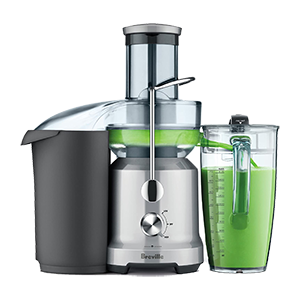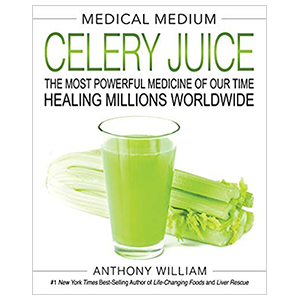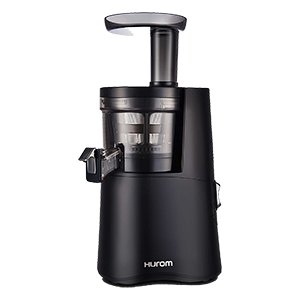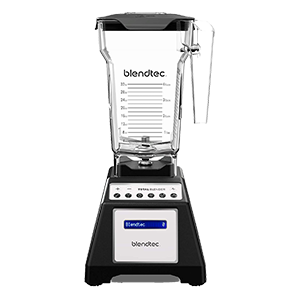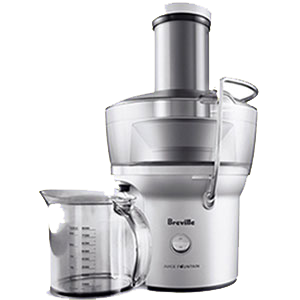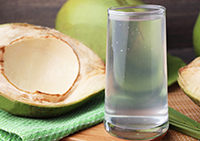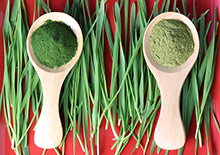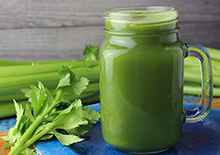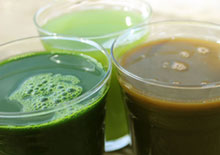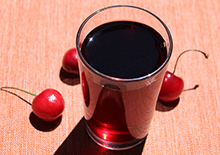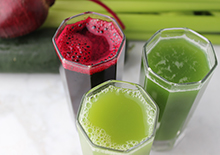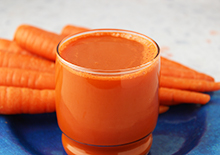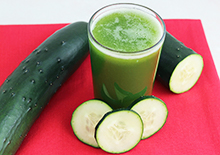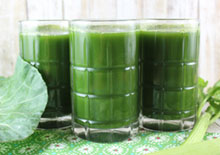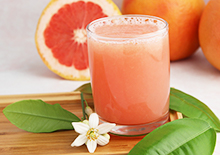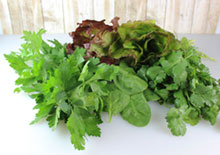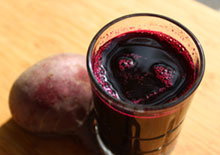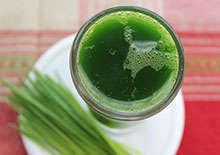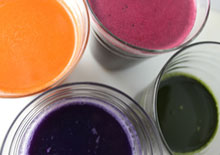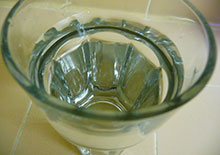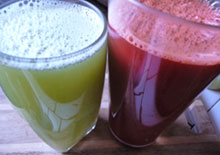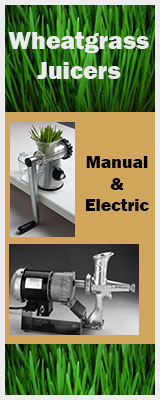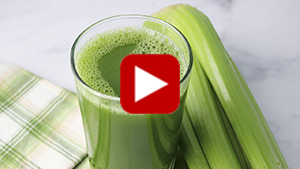- Home
- Super Juicing
- Benefits of Celery Juice
Top Benefits of Celery Juice, Why You Might Want to Consider It
What is Celery Juice? | Top Benefits | Cluster Salts | Nutritional Composition | Purchasing Celery | How to Juice | How to Use | Precautions | Shop
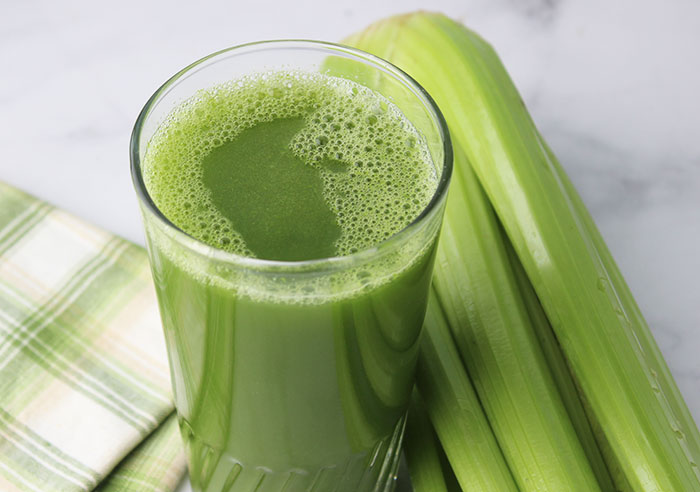
Celery juice is the liquid extracted from raw celery stalks and consuming a daily glass of this bright green drink has become a very popular worldwide trend, particularly starting in the latter half of 2018.
The concept of juicing one particular vegetable variety at a time is occasionally referred to as "mono juicing." Instead of juicing several different types of fruits or vegetables together, like when making the typical green juice, mono juices specifically help to concentrate a fruit or vegetable’s health-enhancing constituents.
Table of Contents
What is Celery Juice? | Top Benefits | Cluster Salts | Nutritional Composition | Purchasing Celery | How to Juice | How to Use | Precautions | Shop
In this case celery is the star of the show and many people,
including ourselves, have been consuming it for many days in a row to
experience the potential benefits of this common cultivated vegetable.
Celery juicing over the years has been highly promoted by New York Times best-selling author and "Medical Medium" Anthony William, who is largely viewed as the originator of the recent "global celery juice movement."
Endorsed by a number of Hollywood celebrities, his celery juice health claims are not necessarily supported by actual science but rather from "channeled" information. His basic recommendation is to consume 16 ounces (.47 liters) of pure celery juice first thing in the morning on an empty stomach.
While many people are reporting to feel the healing qualities of celery juice consumption, to date there has not been much research to back up its therapeutic influence. We can only therefore look at the studies on celery (Apium graveolens) as a vegetable species.
On this page, we will briefly review some of the main non-scientific components in celery juice, as presented by Medical Medium, in addition to some of the logical benefits of celery stalks that can be especially enhanced when juiced.
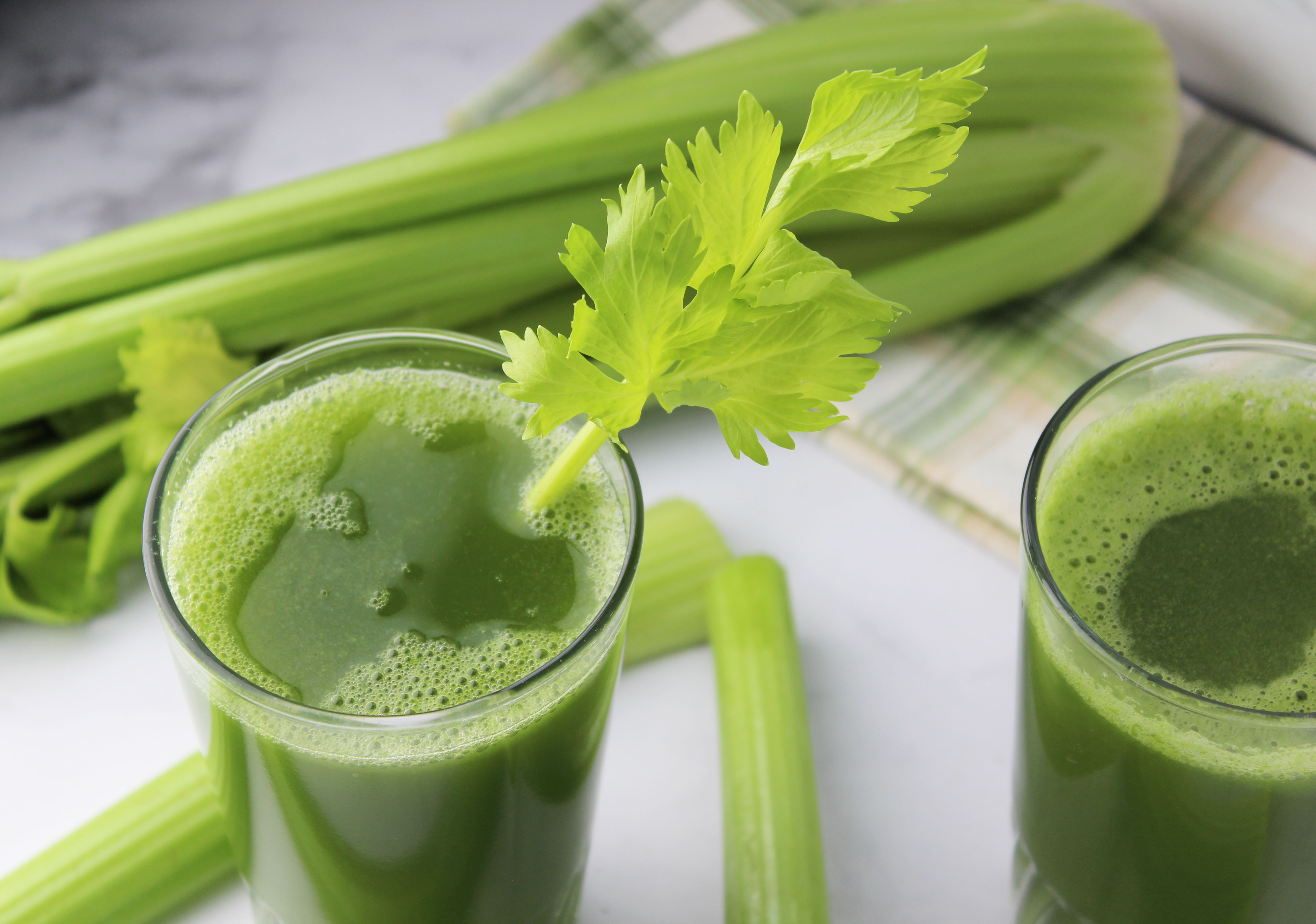
Top Benefits of Celery Juice
1) A Cleansing Detox Drink
2) Can Relieve Skin Issues
3) Phenolic and Anti-Inflammatory Compounds
4) May Help to Reduce "Brain Fog"
5) For Digestion and a Healthy Gut
1) A Cleansing Detox Drink
Straight celery juice, as a mono juice variety, can be a medicinal and cleansing drink. Celery itself is a vegetable that is high in water content. When juiced it is very hydrating and alkalizing to the body which can help to reduce overly acidic conditions as well as cleanse and flush out toxins.
Raw celery, especially when immediately consumed after juicing, is also high in living plant enzymes which may further assist in the breakdown of undigested wastes and encourage their release.
For many, including ourselves, celery juice consumption following the 16 ounce daily portion, tends to stimulate and/or increase bowel movements. By enhancing the process of elimination, it can simultaneously improve liver function and open the detoxification pathways, which also involves the lymph, intestinal and kidney systems.
In Chinese medicine, the vegetable celery (called Qin Cai) helps to "cool" the liver and is thought to be purifying to the blood. With its diuretic properties and balance of the mineral's sodium/potassium, it can also be useful for fluid regulation.
Celery is a cholagogue, or a food known to increase the flow of bile, and helpful for the digestion of fats. The juice is considered potentially beneficial as a dietary adjunct for maintaining a healthy gallbladder. From our perspective, the bile stimulating element may in part come
from the slightly bitter taste of celery when concentrated as a juice,
especially if the leaves are included.
Believed to Contain "Cluster Salts"
According to Anthony William, one of the main substances in celery that make it so beneficial are the yet undiscovered "subgroups of the sodium mineral" he calls "cluster salts."
He believes these natural food-based sodium salts can destroy pathogens, bind to toxins and help pull them from the liver organ. Cluster salts and their detoxifying qualities are likewise claimed by Medical Medium to be good for many autoimmune related conditions like Epstein-Barr and shingles.
2) Can Relieve Skin Issues and Promote Clear Complexion
Most skin eruptions are directly connected to the health of the liver which also plays an important part in regulating hormones.
Therefore, foods, drinks and herbs that are cleansing to the liver, often naturally help to clear up skin conditions like acne, rashes or other epidermal outbreaks.
Along with a health promoting diet and lifestyle choices, a daily celery juice protocol for a number of days in a row might be a relatively inexpensive and do-able option to consider for clearing up skin breakouts.
The electrolyte content in the juice also helps to regulate fluids, blood pH levels and prevent dehydration. It can be a great drink for rehydrating the body before or after an intensive workout session or exercise regimen, when eliminatory channels and lymph are open and cleansing out toxins.
Its hydrating qualities are of course also moisturizing to the skin and likewise support a healthy smooth supple complexion.
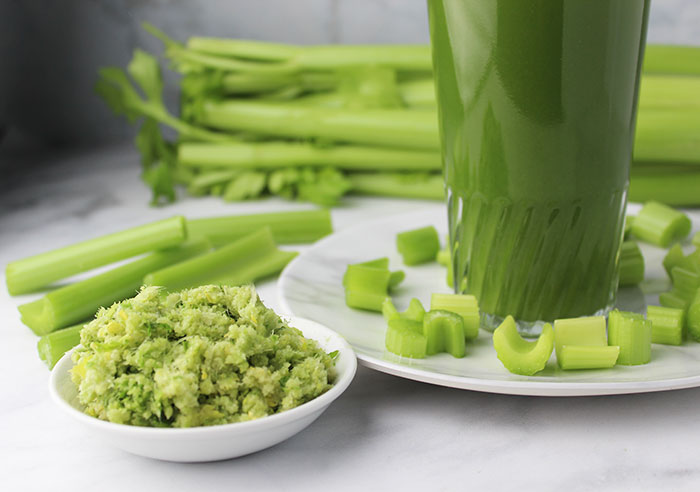
3) Phenolic Compounds and Anti-Inflammatory Properties
Common celery is composed of phenolic compounds, such as flavonoids and phenolic acids, that can act as antioxidants as well as reduce inflamed conditions.
There is not much research on celery stalk juice itself, but it is fairly safe to assume that the components found in the whole aerial part of the vegetable are not only transferred to the juiced liquid but are also significantly concentrated when the fiber is removed.
Celery has been shown to contain some tannin and saponin content. The major constituents, however, include the phenolic acids: caffeic acid, p-coumaric acid, ferulic acid in addition to the flavonoids: apigenin, luteolin, and kaempferol. According to a 2018 research review, these substances have been shown to provide a protective antioxidative influence.
Celery contains the same two anti-inflammatory flavonoids, apigenin and luteolin, that are also found in parsley leaves and chamomile tea as well as in the liver detoxifying herb known as dandelion root.
Celery juice supplementation, with its soothing and cooling anti-inflammatory attributes, is believed to be beneficial for relieving joint pain or rheumatic conditions.
4) May Help to Reduce "Brain Fog"
Other chemical components present in celery include limonene, coumarin, selinenes and the mentioned compound known as luteolin, which has been shown to be helpful for countering brain inflammation. (Source)
Dietary luteolin is a bioflavonoid known for its potent actions as an antioxidant and anti-inflammatory. In 2017 research, luteolin was studied for its anti-inflammatory effects and ability to cross the blood brain barrier and inhibit certain types of β-amyloid inflammation.
Other evidence also suggests its possible usefulness in reducing "brain fog" symptoms of which may include "reduced cognition, inability to concentrate and multitask, as well as loss of short and long-term memory." (*)
Common celery is also composed of the anti-inflammatory agents lunularin, apiuman, bergapten and psoralen as well as butylphthalide and sedanolide, two components responsible for aroma and taste of the vegetable and juice. In one review, celery seeds were acknowledged for their butylphthalide content and reported to have potential as a neuroprotective compound. (Source)
The juice is also valued as an appropriate dietary adjunct for reducing high blood pressure, although we would recommend seeking advice from your healthcare practitioner before using it for such purposes.
In herbal folklore, wild celery was considered a type of anti-anxiety nervine beneficial for conditions like insomnia, most likely because of its neuroprotective compounds like luteolin which is again also found in chamomile tea. Additionally, its detoxifying qualities also may play a role in its overall support to the central nervous system.
5) Benefits of Celery Juice for Digestion and a Healthy Gut
As a medicinal drink one of the benefits of celery juice is that it promotes digestive juices like stomach acid, bile and the enzymes needed to breakdown food into usable nutrients. In Chinese medicine the vegetable is believed to work with the Stomach and Spleen organ systems.
In the book Liver Rescue, it states that it "Removes mucus out of the intestinal tract and liver and increases production of the undiscovered seven-acid blend of hydrochloric acid in the stomach."
In some research on rats, Apium graveolens or celery was shown to provide usefulness for gastric ulcers, by protecting the gastric mucosa lining the inner surface of the stomach.
The alkalizing juice from celery may also offer other therapeutic qualities for inflammation of the GI tract or gastrointestinal system and can be helpful for maintaining a healthy gut with a prebiotic influence on beneficial intestinal microbiota.
The celery plant is a known source of essential oils which have been reported to have antifungal and antibacterial actions. The celery seeds in fact are commonly used as an essential oil and the stalks as well as the leaves themselves also contain these substances to a lesser degree but are more concentrated when juiced.
Benefits of Celery Juice, Things to Keep in Mind
Overall, most health seekers realize that there is more than relying on one particular food, or in this case juice, to heal and restore complete health. While periodic celery juice consumption can be a part of a health-enhancing protocol, we feel it is equally important to commit to making better diet and lifestyles choices that will ultimately influence long-term wellness.
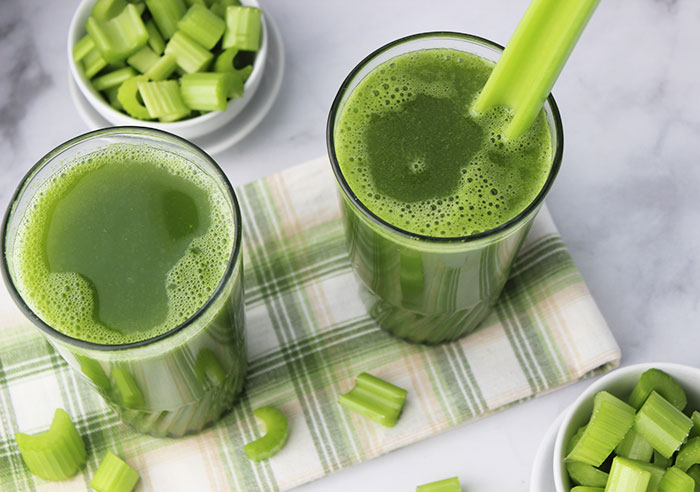
Celery's Nutritional Composition
Celery is especially high in bone nourishing vitamin K and is a good source of folate, vitamin A, and potassium. It also contains amounts of vitamin C, vitamin B6, manganese, calcium, sodium, riboflavin and magnesium. It is comprised of small amounts of protein and sugar content. Celery is also reported to be a good source of silica.
According to nutritional data (*),one cup of chopped celery (101 g) contains approximately:
- Vitamin K - 29.6 mcg, 37%
- Folate - 36.5 mg, 9% DV
- Vitamin A - 453 IU, 9% DV
- Potassium - 263 mg, 8% DV
- Vitamin C - 3.1 mg, 5% DV
- Manganese - 0.1 mg, 5% DV
- Vitamin B6 - 0.1 mg, 4% DV
- Calcium - 40.4 mg, 4% DV
- Sodium - 80.8 mg, 3% DV
- Riboflavin - 0.1 mg, 3% DV
- Magnesium - 11.1 mg,3% DV


Purchasing Celery for Juicing Purposes
In our opinion, it is best to purchase organic celery as conventionally grown varieties are on the "dirty dozen" list of highly sprayed vegetables. If you’re using conventional celery, be sure to wash it well before juicing.
Because you need large quantities of celery to juice, usually about
one head of celery is equivalent to a 16 ounce glass, we have noticed
there has actually been a shortage of celery in many local markets here
in California.
If you're serious about giving this juice trend a try, you
might want to consider special ordering it by the case or half case
which usually yields about 15-30 heads, enough for 2-4 people for a week's
worth of super juicing. This is also a much easier way to transport it, plus you'll often get a discount from many suppliers.
How to Juice Celery
Making straight celery juice is easy. Simply place your cleanly washed, preferably organic whole stalks (or chopped) through a juicing appliance.
Most types of juicers will work for this. The other option is to blend chopped celery in a high-speed blender and strain the juice through a nylon mesh bag, known as a nut milk bag. (See our how to juice with a blender page for more details on this technique.)
It is best to drink your juice immediately for highest nutritional potential. As a secondary alternative you can freeze or refrigerate the juicing liquid, but it will invariably lose some nutrients.
How to Use
Although eating celery stalks as a vegetable can be a very health promoting addition to the diet, drinking straight celery juice with the fiber removed concentrates and increases its healing potential.
The "juice trend" itself is offered as a short daily juicing regimen of between one to two weeks. Most encourage drinking it first thing in the morning on an empty stomach and then waiting 30 minutes to an hour before consuming your first meal.
While the recommended amount to drink is 16 ounces or .47 liters (about one head of celery), this quantity may vary depending on age, body weight and health conditions or goals.
The juice can be quite pleasant tasting, if you happen to like the flavor of celery. We personally juice the leaves as well as the stalks, but this can increase bitterness. However, the bitter taste is also good for the liver.
For juicing purposes, you would of course be using the stalks and leaves, but for culinary use celery root and celery seeds also have their benefits.
Precautions:
Consuming large amounts of celery juice may increase bowel movements or cause loose stools. Beware that celery is on the list of foods that can cause severe reactions to those who are allergic to it. Consult your healthcare professional if pregnant, nursing, taking prescribed medications or if you have a serious medical condition
Shop Related Products (About Affiliates & Amazon Associate Paid Links)
Affiliate Disclaimer: This section contains affiliate product links. If you make a purchase through our recommended links, we receive a small commission at no additional cost to you. Thanks for the support.

